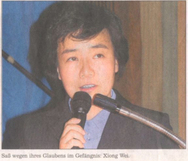 |
At first, the movement had the full support of the Chinese Government but it was [later] prohibited and publicly attacked by the Party. Of particular concern are the human rights violations related to this prohibition, which are constantly being criticised.
An exhibition of photographs and written material held on Saturday in Cham Town Hall presented a variety of information about Falun Gong. In addition, everybody was given the opportunity to sign a petition supporting the plight of the victims of this persecution.
A representative of the IGFM (German branch of the International Society for Human Rights), Utz Römer, accused the West of ignoring this issue, mainly due to economic interests. In addition, other religions and ethnicities in China suffer from the same problem. One hopeful bit of news was that petition drives and interventions of high-ranking German politicians have brought about the release of Ms. Xiong Wei in January of this year.
Ms. Min Teng-Schwägerl, who often campaigns for the rights of Falun Gong in Cham, presented a photo report about her visit to Paris, where she and her husband were detained for a prolonged period of time because she was carrying Falun Gong badges and clothing. The reason for her arrest was intentionally placed misinformation handed to the local police station by authorities in Mainland China. Such schemes are familiar to practitioners and do not simply represent isolated cases, but are part of a targeted persecution. However, her visit to Athens went smoothly because Falun Gong had the full support of the Greek Government and permission to stage a parade during this year’s Olympic Games.
 |
There is no Freedom of Thought in China
A Conversation with Xiong Wei: Petition Signature Drive Ensures her Freedom
 |
Xiong Wei, 33, first heard about Falun Gong during her studies in Berlin. She was enrolled at the Technical University from 1992-1999, studying Economic Engineering. A fellow Chinese student introduced her to Falun Gong. “My chronic head and belly aches disappeared all of a sudden,” reported the little Chinese lady. She says that the physical and mental exercises helped her.
When Xiong Wei returned to Beijing on a business trip arranged by her German employer, she knew full well that practitioners are persecuted and arrested there. For this reason, she practised only in the privacy of her own home. Finally, because her thinking had been influenced by Western democratic ideals, she could no longer passively watch the unjustifiable persecution against practitioners in China and she distributed flyers exposing the injustices.
“The problem is that people in China have no information about the true background. The television almost exclusively shows propaganda and even the Internet is censored,” explains Wei, who is still visibly touched and rattled by those events. Three undercover police officers arrested her within a short while. Without having her identification ascertained, she was forced to spend six hours in a cage-like cell without food, drink or use of the toilet.
She was subsequently taken for interrogation where she had to share a fifteen square metre cell with twenty other women. Everybody had to share a single toothbrush and a long wooden bench where they were supposed to sit during the day and sleep at night. Bugs and a lack of bathroom facilities added to the misery.
“Brainwashing is the main goal of the prison guards. Once I was taken to a building away from the penal institution and was tormented for twenty-four hours without a break by twelve re-education aides and police officers.” She was deprived of sleep, prohibited from sitting, lying down or standing upright, and forced to squat. She had to suffer the propaganda. In addition to the constantly rising physical and mental anguish, she was beaten and threatened with further violence. The goal of the torture is to produce a signature on a ‘confession’ and to force the victim to formally adopt the government’s stance against Falun Gong.
After two months of preliminary detention, and without a trial, sentencing or legal counsel, Wei was told that she would have to spend two years in a women’s forced labour camp for re-education. The prisoners had to wrap 6,000 chopsticks every day and put stickers on them with the label ‘sanitized’; this job continued from early in the morning until late at night and the detainees were constantly exposed to propaganda slogans. They also had to knit sweaters, gloves and scarves which are then exported to the West at rock-bottom prices.
“They used criminal inmates as informers and to perpetrate physical violence,” reports Wei, “in return they were promised a one to two-month reduction of their prison terms.” Despite all the pain and torture she experienced, Xiong Wei still feels that she was treated better than other Falun Gong practitioners. “I always assumed that it was because of pressure from abroad,” she says, “but since I never had any contact with the outside and, because we were not even allowed to talk to each other, I could only hope.”
On January the 5th 2004, her torment finally came to an end and she was released. Along with her documents, she received two packages of postcards from her foreign supporters, asking her not to lose courage and demanding her release. After spending several months at her parents’ home, she returned to Germany in September.
“I know how terrible the persecution in China is and there are still hundreds of thousands who are detained for no reason”, she summarised. Presently she travels all over Germany to talk about her experiences and, above all, to say ‘Thanks’ for all the support. She wanted to express her gratitude in Cham as well, and has indeed done so.
* * *
You are welcome to print and circulate all articles published on Clearharmony and their content, but please quote the source.










 more ...
more ...